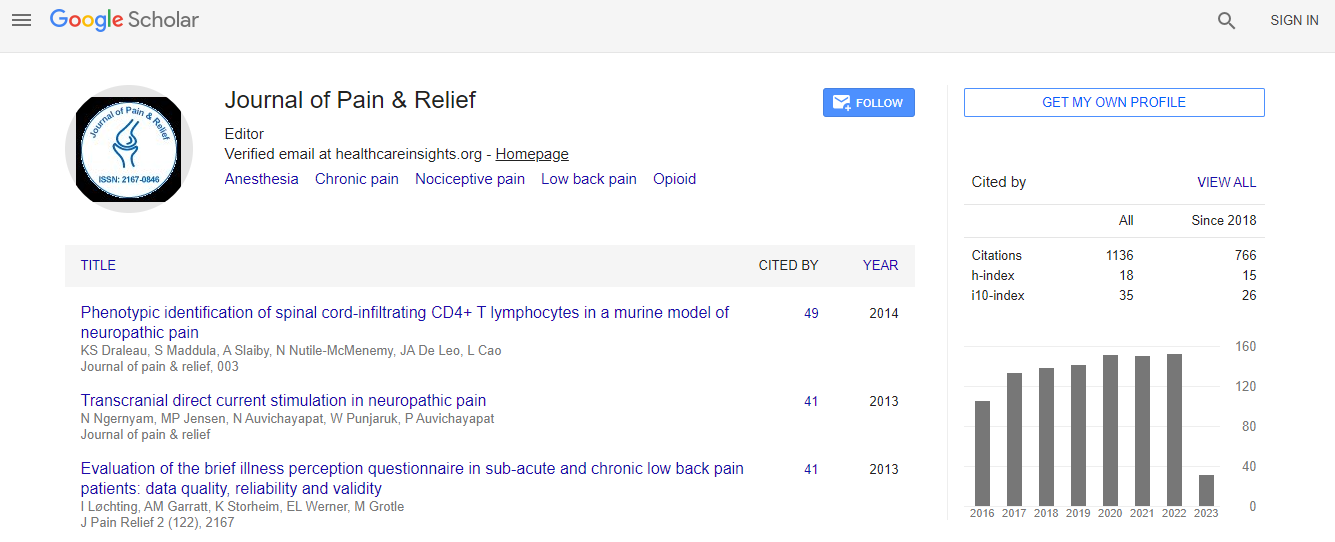Our Group organises 3000+ Global Conferenceseries Events every year across USA, Europe & Asia with support from 1000 more scientific Societies and Publishes 700+ Open Access Journals which contains over 50000 eminent personalities, reputed scientists as editorial board members.
Open Access Journals gaining more Readers and Citations
700 Journals and 15,000,000 Readers Each Journal is getting 25,000+ Readers
Recommended Conferences
42nd Global Conference on Nursing Care & Patient Safety
Toronto, CanadaGoogle Scholar citation report
Citations : 1556
Journal of Pain & Relief received 1556 citations as per Google Scholar report
Journal of Pain & Relief peer review process verified at publons
Indexed In
- Index Copernicus
- Google Scholar
- Open J Gate
- Genamics JournalSeek
- Cosmos IF
- RefSeek
- Hamdard University
- EBSCO A-Z
- OCLC- WorldCat
- Publons
- Geneva Foundation for Medical Education and Research
- Euro Pub
- ICMJE
Useful Links
Recommended Journals
Related Subjects
Share This Page
The effect of serratus plane block performed under direct vision on post-operative pain in breast surgery
2nd International Conference and Exhibition on Pain Medicine
Hards M, Harada A, Neville I, Harwell S, Babar M, Ravalia A and Davies G
Kingston Hospital NHS Foundation Trust, UK
Posters & Accepted Abstracts: J Pain Relief
Abstract
Background: Breast cancer is the most common cancer in women and mastectomy is commonly performed as part of the management. A mastectomy can cause significant acute pain which progresses to chronic pain in 25-60% women. Recent studies have suggested that a serratus plane block is a viable alternative to regional anesthetic techniques without the side effect profile and that injection of local anesthetic into serratus anterior provided predictable and effective anesthesia to the chest wall. Serratus blocks target the thoracic nerves more selectively than pectoral blocks and local blocks can reduce the use of opiates post-operatively thereby lessening opiate related side effects. Design: We performed a retrospective study of elective breast surgery patients undergoing mastectomy over 6 months. We collected data on outcomes for the pain score and use of analgesia in recovery, the use of analgesia and anti-emetics overnight and the pain score and mobilization status of the patient one day after the operation. Our sample included 16 patients who had received a serratus block and 11 patients who only had wound infiltration with levobupivacaine with adrenaline and clonidine. Results: No patients receiving a serratus block suffered severe pain in recovery or day one post-operatively. Patients receiving wound infiltration alone had 2 patients suffering severe pain in recovery and 3 patients suffering severe pain day one post-operatively. Conclusion: Serratus block provides effective regional anesthesia, suitable for mastectomies and appears to be superior to wound infiltration alone. However, further data will need to be collected to support this finding.Biography
Email: dialogischepraxis@gmx.de

 Spanish
Spanish  Chinese
Chinese  Russian
Russian  German
German  French
French  Japanese
Japanese  Portuguese
Portuguese  Hindi
Hindi 
